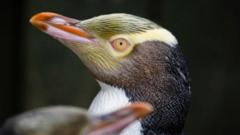A shy yellow-eyed penguin has come out on top of one of New Zealand’s most contested competitions to win Bird of the Year.
More than 50,000 people voted in the competition – which has in the past seen its fair share of scandal – including claims of foreign interference and allegations of cheating.
Last year, the pūteketeke won the competition after comedian John Oliver threw his weight behind it, launching a campaign that involved him dressing up as the bird, complete with a striking burnt-orange mullet.
Thought to be one of the world’s rarest penguin species, the hoiho can be found only in New Zealand.
According to Forest & Bird, the organisation that runs the competition, the hoiho secured a victory with 6,328 votes – ahead of the Karure Chatham Island black robin with more than 5,000 votes.
This is the second time the hoiho has swooped in to win the competition, having also come in first in 2019 – the same year where allegations arose that the hoiho had only won after Russian interference.
Hundreds of votes for the bird were found to have come from Russia, though Forest & Bird said these were likely not fradulent votes, but those from Russian ornithologists.
In 2018, there were also claims that Australians tried to rig the contest in favour of the shag – a species of cormorant.
The hoiho, whose Maori name means “noise shouter”, is notoriously shy despite its loud, shrill call, says the organisation, who said the win would raise conservation efforts for the species.
It is an endangered species or three steps away from extinction and its numbers are decreasing, according to the International Union for Conservation of Nature and Natural Resources.
“This spotlight couldn’t have come at a better time,” said Forest & Bird’s chief executive Nicola Toki. “This iconic penguin is disappearing from mainland Aotearoa (New Zealand) before our eyes.”
Conservation efforts are taking place on land but Ms Toki says they are also needed at sea.
“They’re drowning in set nets and can’t find enough food,” she said. “Our hoiho urgently need marine protected areas to give them a shot at survival.”

